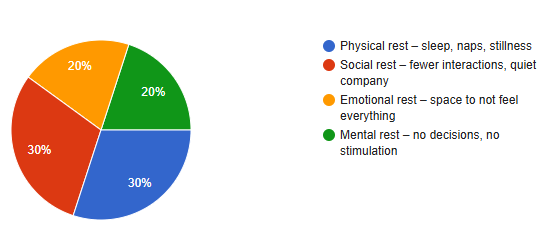- ABC of Mental Health
- Posts
- Are You Resting or Just Scrolling? The Truth About Digital Fatigue
Are You Resting or Just Scrolling? The Truth About Digital Fatigue
ABC of Mental Health
Hello from The Social Therapist, your partner to better mental health, one newsletter at a time! In a world where “rest” often looks like endlessly scrolling through Instagram, it's worth asking: are we actually relaxing, or just zoning out?
This week, we’re diving into the hidden cost of digital fatigue. Let’s explore how to move from mindless scrolling to mindful resting, so you can feel truly refreshed, not just distracted. If you like this post, share it with a friend via WhatsApp today!
One relevant recommendation:
If you think scrolling is harmless downtime, the 8-minute video linked above is for you! This brief, no-fluff video, explains how apps are designed to hijack your attention, trigger dopamine cycles, and leave your brain more overstimulated than rested. Over time, this can lead to burnout, brain fog, and trouble switching off, even when you’re exhausted.
Two Quotes on Digital Fatigue:
“The truth is that we are now living in an attentional pathogenic culture—one in which sustained and deep focus is harder for all of us.”
Anne Lamott, author and teacher, offers a simple but powerful reminder that restoration starts with pausing, not pushing through:
“Almost everything will work again if you unplug it for a few minutes… including you.”
Three TherapyShorts from TST
Not Doing ≠ Resting
You can stop working and still not be resting. If your “breaks” are filled with TikToks, reels, or catching up on messages, your brain never gets a real pause. True rest is about giving your nervous system space to soften. That might mean lying on your bed without a screen, or listening to your breath for 60 seconds. Sounds boring? Maybe. But your body will thank you. Start with 5 minutes a day that are completely undistracted. It’s not a productivity hack—it’s a way to remember what it feels like to just be.
Why We Scroll When We're Tired
Sometimes we don’t scroll because we’re bored—we scroll because we’re lonely, or anxious, or too exhausted to do anything else. It’s comforting. It fills the silence. But underneath the screen, there’s often a feeling we’re trying not to feel. That’s not weakness—that’s coping. But it can also leave us emotionally full but energetically starved. Next time you find yourself reaching for your phone, try pausing. Ask: What am I actually needing right now? That question alone can start to shift things.
Your Brain Wasn’t Built For This Much Input
Let’s be real: your nervous system wasn’t designed to absorb this much information, 24/7. Every scroll is a new face, thought, sound, ad, or heartbreak. And while some of it is fun or even inspiring, most of it is just noise. Too much of that noise leads to digital fatigue: brain fog, irritability, the constant urge to “check” something. Real rest doesn’t mean cutting off all tech—it just means protecting a little corner of your day from it. One small pocket of stillness can be enough to say: Hey, I’m here. And I’m okay.
A QUICK QUESTION…
When you're exhausted, how do you actually wind down? Vote here!
Last week, we asked about which kind of rest you crave the most right now, and the responses were… (drumroll please)…

With care and compassion,
The Social Therapist
Reply